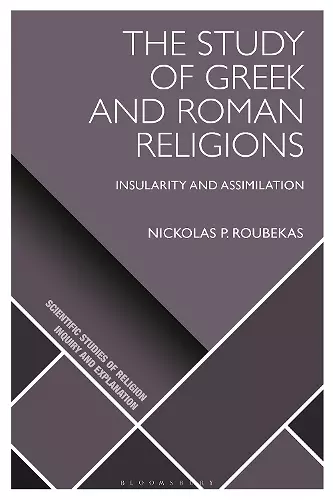The Study of Greek and Roman Religions
Insularity and Assimilation
Format:Hardback
Publisher:Bloomsbury Publishing PLC
Published:11th Aug '22
Currently unavailable, and unfortunately no date known when it will be back

Critiques the disciplinary gap between classical studies and religious studies, and presents suggestions for bridging this gap through a more scientific approach to the study of Graeco-Roman religions.
How should ancient religious ideas be approached? Is "religion" an applicable term to antiquity? Should classicists, ancient historians, and religious studies scholars work more closely together?
Nickolas P. Roubekas argues that there is a disciplinary gap between the study of Greek and Roman religions and the study of “religion” as a category—a gap that has often resulted in contradictory conclusions regarding Greek and Roman religion. This book addresses this lack of interdisciplinarity by providing an overview, criticism, and assessment of this chasm. It provides a theoretical approach to this historical period, raising the issue of the relationship between “theory of religion” and “history of religion,” and explores how history influences theory and vice versa. It also presents an in-depth critique of some crucial problems that have been central to the discussions of scholars who work on Graeco-Roman antiquity, encouraging us to re-examine how we approach the study of ancient religions.
This book is one of a kind. Nickolas P. Roubekas successfully demonstrates how Greek and Roman religions have been historically studied in a one-sided manner. Consequently, he offers appealing and innovative discussions on how this could be amended, primarily by suggesting a more inter-disciplinary collaboration, which includes the findings of the cognitive science of religion. * Panayotis Pachis, Professor of Religious Studies, Aristotle University of Thessaloniki, Greece *
An interdisciplinary approach to the study of ancient religion is often invoked, but seldom seriously implemented. This book is a valuable reflection on the necessity to build real bridges between classics and religious studies, dwelling deeply on the recent history of both disciplines, their prejudices, and their self-limiting boundaries. Even those who do not share Roubekas’ proposals will profit from his clear, thorough, and honest discussions of scholarship. * Miguel Herrero de Jáuregui, Professor of Greek Philology, Complutense University of Madrid, Spain *
Roubekas’ book is replete with provocative and fresh ideas… and seems to pack an epistemological punch well above its weight. * British Association for the Study of Religions Bulletin *
ISBN: 9781350102613
Dimensions: 238mm x 160mm x 18mm
Weight: 440g
192 pages